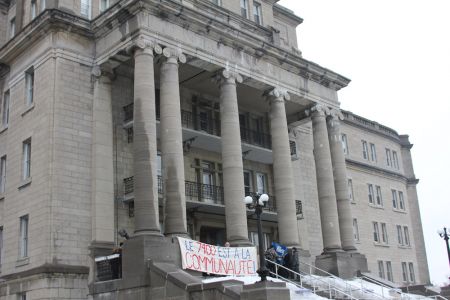Originally published on Spacing Montreal
Twenty-nine community groups are facing eviction from a public institution this month that has served Villeray-Saint Michel-Parc Extension for nearly 100 years.
The Centre 7400 on Saint-Laurent Boulevard will be converted into luxury condominiums come June 30 after a long battle to preserve its public function.
“Nous croyons qu’une bonne partie de la population aurait aimer que ce centre demeure avec une utilisation publique: c’est-à-dire, sous la forme de centre communautaire,” says Andres Fontecilla.
In February 2010, Fontecilla helped form the Coalition des amis du 7400 Saint-Laurent after a newspaper article reported on the Centre’s redevelopment plans. The coalition brought together the building’s current occupants; members of the deaf and mute community; merchant and tenant rights organizations; and Villeray inhabitants fearing the neighborhood’s gentrification.
The Centre 7400 is owned by the clerics of Saint-Viateur. It was built in the 1920s to house the Institut des Sourds-Muets. Since the 1970s, it has been occupied by religious and secular community organizations, as well as providing inexpensive short-term lodging and conference space.
The clerics of Saint-Viateur offered the building to the deaf and mute community—but for a price its members could not afford. The coalition then asked the municipal government to place a two year moratorium on the rezoning of the building to allow time to negotiate with the clerics. The moratorium was refused.
The building should remain in the public interest, as everyone had contributed to—and benefited from—the Centre, argues Fontecilla. But privatizing the space will change that: “Ces bâtiments sont construits grâce à l’argent de la communauté et aujourd’hui on privatise un bien qui était construit grâce à l’argent de nos parents et nos grans-parents…On ne voit pas pourquoi aujourd’hui seulement les plus riches peuvent en profiter alors que tout le monde à contribuer à la construction de ces bâtiments.” http://spacingmontreal.ca/wp-includes/js/tinymce/plugins/wordpress/img/m...); background-attachment: initial; background-origin: initial; background-clip: initial; background-color: rgb(255, 255, 255); background-position: 100% 0%; background-repeat: no-repeat no-repeat; " title="More..." />
http://spacingmontreal.ca/wp-includes/js/tinymce/plugins/wordpress/img/m...); background-attachment: initial; background-origin: initial; background-clip: initial; background-color: rgb(255, 255, 255); background-position: 100% 0%; background-repeat: no-repeat no-repeat; " title="More..." />
Thibault, Messier, Savard, and Associates Inc. (TMSA) plan for 302 new condominiums—none of which are social housing units. According to the city of Montreal’s “Stratégie d’inclusion de logements abordables dans les nouveaux projets résidentiels” adopted in 2005, every new residential development over 200 units must allocate 15 per cent of those units to social housing. Instead, TMSA offered the coalition $300,000.
“On ne veut pas $300,000; on veut des logements sociaux,” says Fontecilla, calling the monetary compensation insufficient and insulting.
Habiter Montréal reports that the 5.4 per cent of occupied social housing units in Villeray already falls below Montreal’s average of 7.1 per cent.
The Office de consultation publique de Montréal (OCPM) agreed that the compensation was unsatisfactory. It was hired by the municipal government to hold public meetings on the future of the Centre 7400. In February, the OCPM released its findings: they supported the condominiums.
The report notes the belief by many that the condominiums will boost Villeray’s commercial and service sectors, as well as the neighborhood’s attractiveness. But it also mentions the majority of consultation attendees lamented the loss of a public institution, especially one close to a park, metro stop and bus lines.
OCPM’s secretary general Luc Doray clarified the Centre’s redevelopment was only found acceptable in light of the fact that no money came forward to sustain the public function of the building. Doray highlighted the report’s suggestion that the city of Montreal play an active role in helping the current occupants of the Centre 7400 find new lodgings. The OCPM also proposed the increased monetary compensation by TMSA should be allocated to constructing social housing on a nearby site.
These recommendations have not yet seen the light of day—and the coalition doubts they ever will. On March 29, the municipal government’s executive committee approved the redevelopment of the Centre 7400 in an open vote. All but two members of Projet Montréal voted in favor of the condominiums.
Patrick Cigana, director general of Projet Montréal, admits his party was divided on the issue. The project conflicts with parts of Projet Montréal’s mandate, such as demanding at least 25 per cent of new residential units include social and affordable housing and protecting the rights of tenants when it comes to urban planning. Still, Cigana says the project “fits well with our program” because of it’s transit-oriented development, large apartments for families, and green spaces.
Projet Montréal estimated an offer of $1.124 million would be needed to build 300 social housing units. But the money is unlikely to surface. The city of Montreal’s strategy for social and affordable housing is not binding; it’s merely a guideline. Doray says developers must at least make an effort to offer compensation to current tenants, but the municipal government can choose to overlook the Stratégie—and often does.
It’s a matter of money, says Marie-Josée Corriveau of the Front d’action populaire en réménagement urbain, a provicinial organization which protects the housing rights of Quebeckers and supported the coalition. Corriveau notes 80 per cent of the city’s revenue comes from property taxes: a fact she believes will lead to the increasing gentrification of Montreal.
But the coalition is hoping to deter this urban planning trend. On May 25, it held a small meeting to assess the failed efforts to maintain the Centre 7400 as a public institution, and to brainstorm how to better protect against such developments in the future.
The meeting’s organizers saw the need to create a public assembly to discuss public buildings under possible threat and fortify against their potential redevelopment before it even begins. A liaison committee was also proposed to form informational and tactical alliances with adjacent neighborhoods.
“Même si on n’a pas gagné la lutte pour le Centre 7400,” says Fontecilla. “On a gagné la solidarité.”




